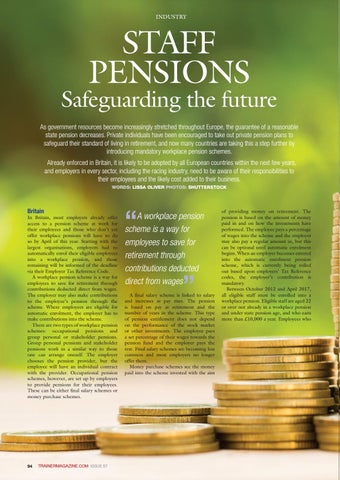INDUSTRY
STaff peNSIoNS
Safeguarding the future As government resources become increasingly stretched throughout Europe, the guarantee of a reasonable state pension decreases. Private individuals have been encouraged to take out private pension plans to safeguard their standard of living in retirement, and now many countries are taking this a step further by introducing mandatory workplace pension schemes. Already enforced in Britain, it is likely to be adopted by all European countries within the next few years, and employers in every sector, including the racing industry, need to be aware of their responsibilities to their employees and the likely cost added to their business. WORDS: LISSA OLIVER PHOTOS: SHUTTERSTOCK
Britain
In Britain, most employers already offer access to a pension scheme at work for their employees and those who don’t yet offer workplace pensions will have to do so by april of this year. Starting with the largest organisations, employers had to automatically enrol their eligible employees into a workplace pension, and those remaining will be informed of the deadline via their employer Tax Reference Code. a workplace pension scheme is a way for employees to save for retirement through contributions deducted direct from wages. The employer may also make contributions to the employee’s pension through the scheme. Where employees are eligible for automatic enrolment, the employer has to make contributions into the scheme. There are two types of workplace pension schemes: occupational pensions and group personal or stakeholder pensions. Group personal pensions and stakeholder pensions work in a similar way to those one can arrange oneself. The employer chooses the pension provider, but the employee will have an individual contract with the provider. occupational pension schemes, however, are set up by employers to provide pensions for their employees. These can be either final salary schemes or money purchase schemes.
94
“
A workplace pension scheme is a way for employees to save for retirement through contributions deducted direct from wages
”
a final salary scheme is linked to salary and increases as pay rises. The pension is based on pay at retirement and the number of years in the scheme. This type of pension entitlement does not depend on the performance of the stock market or other investments. The employee pays a set percentage of their wages towards the pension fund and the employer pays the rest. final salary schemes are becoming less common and most employers no longer offer them. Money purchase schemes see the money paid into the scheme invested with the aim
of providing money on retirement. The pension is based on the amount of money paid in and on how the investments have performed. The employee pays a percentage of wages into the scheme and the employer may also pay a regular amount in, but this can be optional until automatic enrolment begins. When an employer becomes entered into the automatic enrolment pension scheme, which is currently being rolled out based upon employers’ Tax Reference codes, the employer’s contribution is mandatory. Between october 2012 and april 2017, all eligible staff must be enrolled into a workplace pension. eligible staff are aged 22 or over not already in a workplace pension and under state pension age, and who earn more than £10,000 a year. employees who
TRAINERMAGAZINE.COM ISSUE 57
EUROPEAN TRAINER ISSUE 56 STAFF PENSIONS.indd 80
31/03/2017 09:50
